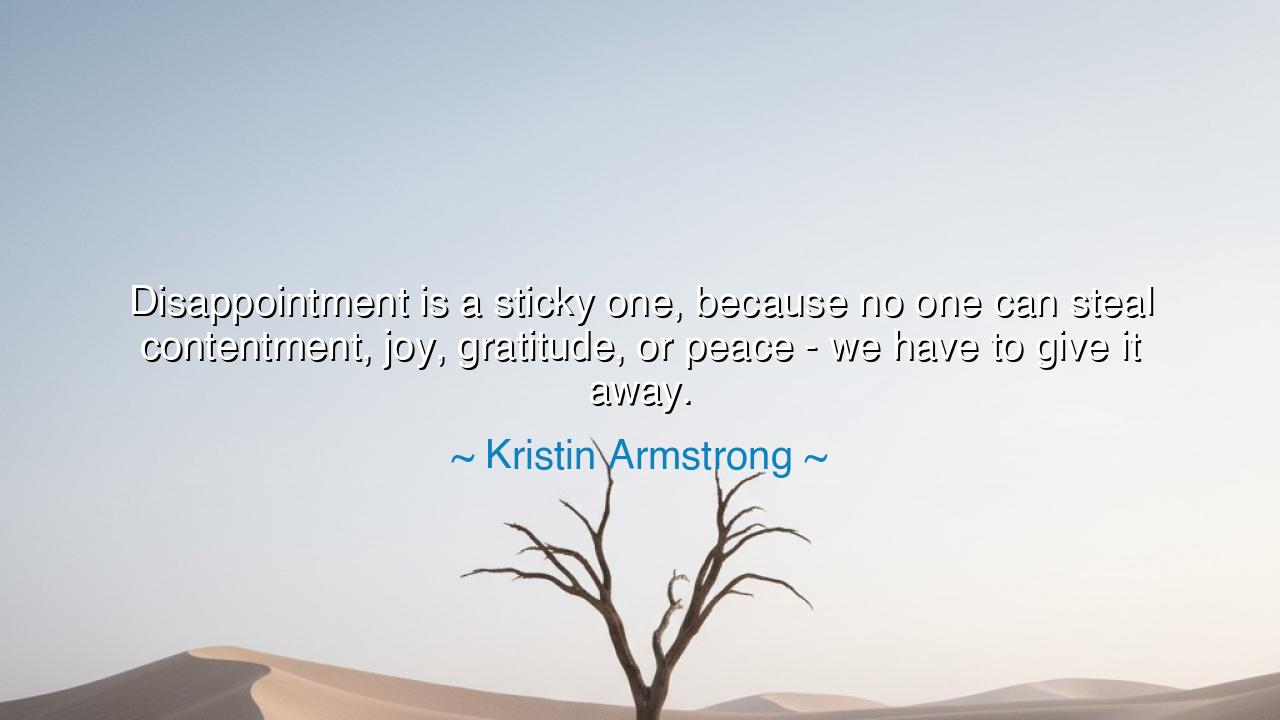
Disappointment is a sticky one, because no one can steal
Disappointment is a sticky one, because no one can steal contentment, joy, gratitude, or peace - we have to give it away.






Hear the words of Kristin Armstrong, a seeker of wisdom and endurance, who reminds us of the fragile yet powerful treasures of the heart: “Disappointment is a sticky one, because no one can steal contentment, joy, gratitude, or peace—we have to give it away.” In these words, she unveils a truth both humbling and liberating: that our deepest treasures cannot be taken by force, but only surrendered by our own choice.
The meaning of this saying is clear: the world will bring disappointment, for expectations fail and hopes are often unmet. Yet the danger lies not in the blow itself, but in our response to it. When we allow disappointment to poison our spirit, we give away our contentment. When bitterness replaces acceptance, we surrender our joy. When envy clouds our vision, we discard our gratitude. And when resentment festers, we forfeit our peace. Armstrong teaches that these gifts are not stolen—they are relinquished by our own hand.
The origin of this wisdom lies in the discipline of endurance. Armstrong, known not only as a writer but also as a long-distance cyclist, understood that disappointment—whether in sport, in life, or in love—is inevitable. Yet she also knew that the strongest victories are not of the body but of the mind: to guard the inner sanctuary of the heart, even when the outer world falls into disorder. This echoes the ancient teachings of the Stoics, who declared that no man can rob us of our inner freedom unless we yield it.
History shows us this truth in vivid light. Consider Viktor Frankl, a prisoner in the Nazi camps. Stripped of home, freedom, and dignity, he wrote that even in such darkness there remained one freedom that could never be taken: the freedom to choose one’s attitude. Many around him despaired, surrendering their joy and peace to cruelty. Yet Frankl clung to meaning, gratitude, and even hope, proving Armstrong’s words: the treasures of the soul can only be surrendered, never stolen.
O children of tomorrow, learn this: when disappointment comes, you stand at a crossroads. One path leads to surrender—letting grief, anger, or bitterness rob you of your inner gifts. The other path leads to resilience—holding fast to contentment, joy, gratitude, and peace, even as tears fall. The choice is yours. The blow may be unavoidable, but the response belongs to you alone.
Reflect, then, upon your own life. Have you given away your peace because of an insult? Have you abandoned your gratitude because of a missed opportunity? Have you allowed the small wounds of disappointment to rob you of treasures greater than gold? If so, remember that you hold the key to reclaim them. No thief has stolen them—they remain within you, waiting for you to take them up again.
The lesson is clear: guard your heart. When disappointment comes, breathe deeply, and remind yourself that though the world can shake your plans, it cannot touch your spirit unless you allow it. Practice gratitude daily, hold onto joy in small things, and protect your peace as the most sacred of possessions. In this way, you will become unshakable, even in a world full of storms.
So let Armstrong’s words be carved into your heart: “No one can steal contentment, joy, gratitude, or peace—we have to give it away.” Do not give them away. Hold them close. For these treasures, once guarded, will sustain you through every disappointment, and lead you to a life of quiet strength and radiant hope.






HPHoa Phung
This quote feels empowering, as if it’s suggesting we hold the key to our own happiness. But if disappointment is something we have the power to 'give away,' does that mean we also have the power to take it back? Can we consciously choose to reclaim our joy when it feels lost, or are there deeper factors at play that make that process more difficult than it sounds?
TNAn Tam Nguyen
I love the message of personal responsibility in Armstrong’s words, but I also wonder: Is it always realistic to expect that we can control how we feel, especially during hard times? While it’s true that we might give away our peace by focusing on negativity, aren’t there times when external events or people can make us feel helpless? Can we truly always protect our peace from outside influences?
TH11. Luu Thi Hoa
This quote raises an interesting point about ownership of our emotions. I agree that contentment, joy, and peace are internal, but isn't disappointment something that often stems from unmet expectations? Can we truly say we give away our happiness, or are there times when life simply doesn’t align with our desires, and that’s where disappointment creeps in? Is it all about perception and mindset, or is there more to it?
HNNguyen Thi Hong Nhung
I find Armstrong’s view on disappointment quite insightful, but I wonder if it’s always as simple as 'giving it away.' Life can be unpredictable, and sometimes we might feel like joy or peace is taken from us without consent. How do we protect these feelings when we’re surrounded by difficult situations or people who seem to drain our energy? Can we truly maintain contentment when things feel beyond our control?
LHLan Huynh
Kristin Armstrong’s perspective on disappointment really hits home. It makes me think, though, is it possible that people unintentionally give away their contentment or peace? Sometimes, it feels like external factors chip away at those feelings, like stress or negativity from others. Do we really have full control over keeping our joy, or are there moments where we might lose it due to circumstances outside our control?